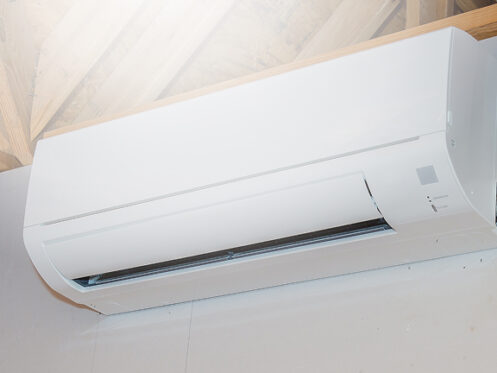Homeowners in the Eugene, OR area who are weighing their heating and cooling options may come across ductless HVAC systems as a possibility. These are sometimes called mini-splits, and they’re growing in popularity. Whether you’re upgrading an older home or adding space in your home, these systems offer an appealing alternative to HVAC systems that require ductwork throughout the home. Like any home improvement investment, these units have benefits and drawbacks that you must consider if you’re considering them.
What Is a Ductless HVAC System?
A ductless HVAC system offers heating and cooling in your home without having traditional ductwork. It consists of an outdoor compressor and indoor air-handling units. The air-handling unit is usually mounted on the wall or ceiling. Drainage occurs through a small hose that’s attached to the air handler. A refrigerant line and power line pass through the same hole but are independent of each other.
The Benefits of Going Ductless
There are many benefits to using a ductless HVAC system, one of which is the flexibility that comes with not having to connect to ductwork. The main benefits of using a ductless HVAC system include the following.
Energy Efficiency
One of the biggest benefits of using a ductless HVAC system is that they’re energy efficient. They don’t lose energy through leaky ducts because they deliver heated or cooled air directly into the room. Most mini-splits feature inverter-driven compressors that adjust the air output based on the current demand.
Dual Heating and Cooling
Ductless HVAC systems are heat pumps. This can provide both hot and cold air from one unit. They’re beneficial for homeowners who favor electric heating.
Customizable Zone Control
Mini-splits allow you to create different climate zones in your home because each unit functions independently. Zoning is possible with traditional HVAC systems, but they require additional equipment to do this. People can adjust the temperature in their own rooms without it impacting the rest of the home.
Easy Installation
Ductless HVAC systems are relatively simple to install. A small 3-inch hole is usually all that’s needed to connect the units, so your home’s structure isn’t disrupted during the installation process.
Potential Drawbacks to Consider
While ductless systems offer many benefits, there are some specific drawbacks to consider. These include the following.
Higher Up-Front Costs
The initial investment for a ductless HVAC can be higher than a traditional HVAC system. This is especially true when there are multiple indoor units necessary. Eventually, the long-term energy savings can offset the costs.
Limitations in Multizone Setups
Zoned comfort is a major benefit of these units; however, there are often limitations on the configurations that are suitable. In some cases, the more zones you add, the less efficient the system becomes.
Aesthetic Consideration
Unlike hidden ductwork, ductless HVAC units are visible inside of your home. While modern models are fairly sleek and have a minimalist design, they still require ceiling or wall space that may not suit everyone’s design preferences.
Ideal Homes and Use Cases
Ductless HVAC systems are especially well-suited for specific homes and situations.
Older Homes Without Existing Ductwork
Trying to retrofit an older home for ductwork can be expensive and invasive. Using a mini-split system is a non-disruptive option.
Home Additions and Renovations
Additions or conversions often benefit from a mini-split system because it can be time-consuming and cost-prohibitive to try to tap into the existing ductwork to install a traditional HVAC system.
Downsizing Within the Home
A mini-split system can enable people who are downsizing, such as new empty nesters, to heat and cool only the portion of the home they’re using. This can save them money and energy.
Rooms With Special Climate Needs
Spaces like finished basements, rooms with large windows, and sunrooms often require temperature control that doesn’t affect the rest of the home. Ductless HVAC systems make it possible to keep everyone in the home comfortable.
Talk to Reynolds About Ductless HVAC
If you’re considering a ductless HVAC system for your Eugene-area home, Reynolds Electric and Plumbing is here to help. Our experienced team can walk you through the pros and cons, evaluate your home’s layout, and design a custom solution that meets your comfort and efficiency goals.
We install a full range of ductless mini-splits and heat pumps, and we’re happy to answer any questions you have about costs, performance, or installation logistics. Contact Reynolds today to schedule a consultation or learn more about how a mini-split system can fit into your home improvement plans.




